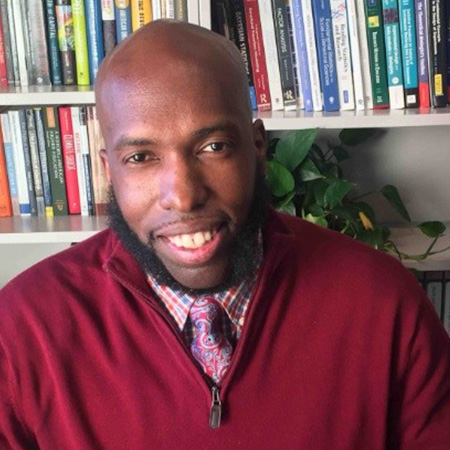Beyond Content: Teaching for Civic Participation and Engagement

View Recording on Panopto (restricted to the MIT community).
On Wednesday, April 10, we hosted Dr. Bryan Dewsbury to discuss the role that faculty play in supporting students’ identities in college and in their future engagement as citizens.
Cultivating meaning and purpose as “emerging adults”
Dr. Bryan Dewsbury shared his personal story of the day he arrived on campus as a first-generation freshman at Morehouse College with his parents at his side. Beaming with pride, they told him they had taken him as far as they could, and everything from here would be “up to him.” At the time, he did not quite understand what that meant. Still, when he had to inform them during his sophomore year that he came very close to losing his scholarship due to some missteps in balancing his coursework (in this case, bad advice from a well-meaning advisor), he began to understand. If he lost his scholarship, he could not continue—his parents could not pay the tuition, and he would have to come home. There was nothing else that they could do, but at least “they gave it a shot.” In telling his story as a first-gen student, Dewsbury emphasized something about the hidden curriculum that is often forgotten: Not only do first-gen students (and other historically marginalized students) not know what the hidden curriculum is, they don’t know that they don’t know it. In other words, because they don’t know that a hidden curriculum shapes how people move through higher-ed spaces, they can’t even ask for help navigating it.
The hidden curriculum is one example, Dewsbury argues, of how instructors must revise their mindset and reimagine how they understand their responsibilities to students, including helping them navigate the hidden curriculum and supporting them as they become their best cognitive and social selves. Beyond teaching disciplinary knowledge and skills, instructors should provide the space to allow students to:
- Think critically about who they will become.
- Learn how to engage with others in their discipline and the larger society.
- Grow as responsible citizens in a democracy (especially during social upheaval and political polarization).
Dewsberry says this is the driver of equity-minded teaching and should be the central paradigm of one’s teaching practice.
What is the goal of (inclusive) education?
“…the sharing of social experience so that children become integrated into the
John Dewey, ~1930
democratic community.”
The idea that education’s purpose is to prepare students to be citizens in a democracy goes back even before Dewey. America’s Founders were concerned about the possibility of a “democratic mob” and the emergence of demagogues, so they codified a system of checks and balances in the Constitution to minimize the threat of mob rule. But they also acknowledged the critical role that a well-educated citizenry plays in society that can stand up to the threats of demagoguery they felt were endemic to democracies. Dewsbury agrees and argues that “part of an education that is in service of a democracy is teaching students…how to keep a watchful eye” in a non-conspiratorial way and in community with each other.
What would this look like in practice?
Dewsbury describes his approach to teaching introductory biology as more about the “intro than the bio.” While learning biology content is important, Dewsbury acknowledges a difference between “potential and readiness.” Introductory classes in any discipline can bridge readiness by allowing students to develop the skills to think critically both about themselves and the world they occupy. These courses shape students’ disciplinary identity (am I a biologist, scientist, or engineer?) They are also spaces where students can have formative experiences in difficult yet respectful dialogues. So, what would this look like in practice?
Dewsbury presented a study he and his colleagues conducted to document the impact of different pedagogical approaches on student outcomes in their introductory biology courses (Dewsbury et al., 2022). The study tracked different sections of Principles of Biology I and II from 2009-2013, which were taught in the traditional lecture format with three or four summative assessments comprising the majority of the grade they received for the course. In 2014, active learning and inclusive practices were incorporated into one section of Principles I and II, and the other sections remained in lecture format. To make room for the “deep learning” environment Dewsbury wanted for his classroom, he cut about 35% of the bio content out of the syllabus of the revised course.
This new format allowed for activities centered around quality dialogue about power and agency in science. For example, the role sexism played in denying Rosalind Franklin credit for discovering the double-helix structure of DNA; how racism allowed black study subjects to suffer so that science could study the effects of untreated syphilis; how apathetic government officials in Flint, Michigan, failed to adequately address the water crisis that exposed residents to high levels of lead as well as an outbreak of Legionnaires’ disease that killed between 12 and 701 residents.
Dumbed down or smartened up?
The data from this study suggest that all students in the active and inclusive2 sections of the courses achieved better outcomes. In addition, longitudinal data show that the reduction of content from the learning-centered classrooms had no negative impacts on performance and, in some cases, increased performance in upper-level classes. (Dewsbury et al., 2022). Dewsbury and his colleagues argue that teaching students how to learn by giving them the space to explore ideas and discover diverse perspectives instead of “covering the content” will result in a skilled workforce and an informed citizenry capable of civil discourse and full participation in our democracy.
- The official death toll reported by the state was 12, but a 2019 independent study conducted by Emory University in Atlanta found 70 more pneumonia deaths than expected during the same period between 2014-15. (See Nelson, et al., 2020).
↩︎ - In this study, the Biology II active learning classroom was not classified as inclusive largely because it did not follow the specifications pertaining to dialogue outlined in the Dewsbury Framework. ↩︎

About the Speaker
Bryan Dewsbury is Associate Professor of Biology and Associate Director of the STEM Transformation Institute at Florida International University. He is the Principal Investigator of the Science Education and Society (SEAS) research program, a team blending research on the social context of teaching and learning, faculty development of inclusive practices, and programming to cultivate equity in education. Previously, he was at the University of Rhode Island. Bryan is a Fellow with the John N. Gardner Institute, where he assists institutions of higher education cultivate best practices in inclusive education.
Resources
- Fugitive pedagogy: Carter G. Woodson and the Art of Black Teaching.
- The Norton Guide to Equity-Minded Teaching
References
Dewsbury, B. M., Swanson, H., Moseman‐Valtierra, S., & Caulkins, J. L. (2022). Inclusive and active pedagogies reduce academic outcome gaps and improve long-term performance. PloS One, 17(6), e0268620. https://doi.org/10.1371/journal.pone.0268620
Dewsbury B. M. “Deep teaching in a college STEM classroom.” Cultural Studies of Science Education (2019): 1–23.
Kahlenberg, R. D. & Janey, C., (2016). Putting Democracy Back into Public Education. The Century Foundation. https://tcf.org/content/report/putting-democracy-back-public-education
Nelson, K. N., Binney, Z., & Chamberlain, A. T. (2020). Excess pneumonia mortality during a 2014–2015 legionnaires’ disease outbreak in Genesee County, Michigan. Epidemiology, 31(6), 823–831. https://doi.org/10.1097/ede.0000000000001240

